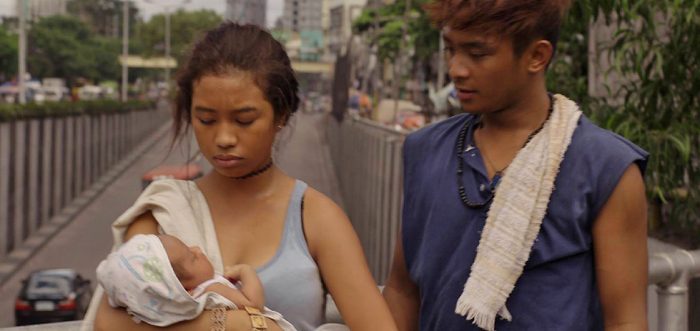In the opening scene of Ordinary People, we watch silent CCTV footage of a homeless woman being hit by a car before the driver swerves off, in clear view of the public. It’s a calm brutality, an indication of what is to come in a film that deals blows to the heart swiftly and with dexterity. In the following moments, we’re thrown into the the heaving streets of Manila, bombarded by traffic noises and wailing people. It is an ominous introduction to the forthcoming drama.
Filipino director Eduardo Roy Jr’s film moves alongside 17-year-old Aries (Ronwaldo Martin) and 16-year-old Jane (Hasmine Kilip), two destitute teenagers with a baby who live on the streets. They steal to survive, engaging in petty theft like snatching mobile phones from cars and sneaking clothing out of stores. Their love is fickle but hardened; they have no family 1 except the one they’ve created with their baby, Arjan. Jane’s and Aries’ fights are volatile, full of harsh words and slaps, but the distance between their bodies always closes in a moment; their dependency on one another is unspoken. When Arjan is stolen by Ertha (Moira Lang), a transgender woman who it is assumed will sell the baby to a childless couple, the pair are forced to scour the streets in search of their one-month-old child — a quest that feels more futile as the film goes on.
This desperation that grips the couple, and especially Jane — performed with heart-stopping integrity by Killip — is palpable to the audience. Their obstacles come in many forms: the corrupt policemen seeking to abuse their power against a young woman; a television station dramatising their story for ratings; and the thief’s mother offering to help in an offer that smells of a scam. At each turn, we’re reminded of society’s derision towards the poor, and the ease with which Jane and Aries can be cast aside or totally unseen —how those in positions of power are often the first to turn a blind eye, having become too desensitised to help nor care.

All the while, the noise persists. The roads are packed with bleating horns and razor-sharp motorbikes, the sidewalks teeming with people; Albert Banzon’s cinematography captures the claustrophobic intensity in a way that feels almost draining, emphasising the exhaustion Jane and Aries must feel as they sleep on the sides of highways and hitch rides on the back of minibuses. The only peace comes in the CCTV footage sporadically edited into the film, which seems to act as our eyes — those of the outsider, the privileged; comfortably watching from a distance. It’s a clever move on Roy Jr’s part, oxymoronically easing the tension with the eerie quiet, while heightening it with the action on screen.
Ordinary People smartly avoids an overdose of pathos for the sake of sentiment. Jane and Aries’ tackle each barrier in their search head on — even when Jane as hysterically crying, her sandals torn, her feet continue to move. Every scene is tinged with sadness: living on the streets may have made Jane and Aries wily, yet their continual blind faith serves as a reminder of their youth — and makes their fate all the more devastating.
It’s almost as if Roy Jr is challenging his audience: “What would you do?,” the film seems to ask.“Would you help these kids? Or would you avoid their eyes and walk away? How would you react if this happened to you?” Ordinary People haunts the mind in this regard. It’s a humanist drama imbued with a deep compassion for people living on the margins: disenfranchised, struggling, surviving.

